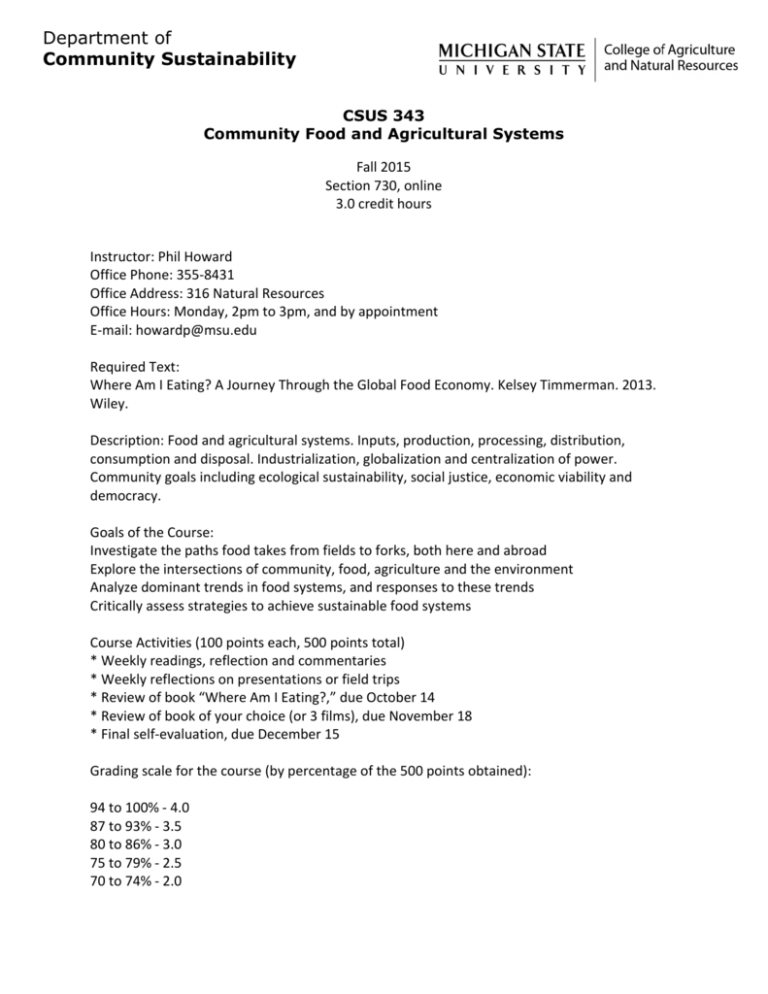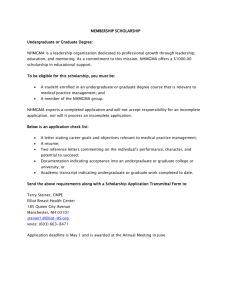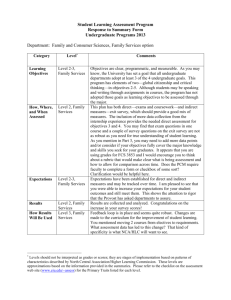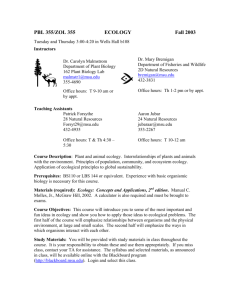Syllabus - Department of Community Sustainability
advertisement

Department of Community Sustainability CSUS 343 Community Food and Agricultural Systems Fall 2015 Section 730, online 3.0 credit hours Instructor: Phil Howard Office Phone: 355-­‐8431 Office Address: 316 Natural Resources Office Hours: Monday, 2pm to 3pm, and by appointment E-­‐mail: howardp@msu.edu Required Text: Where Am I Eating? A Journey Through the Global Food Economy. Kelsey Timmerman. 2013. Wiley. Description: Food and agricultural systems. Inputs, production, processing, distribution, consumption and disposal. Industrialization, globalization and centralization of power. Community goals including ecological sustainability, social justice, economic viability and democracy. Goals of the Course: Investigate the paths food takes from fields to forks, both here and abroad Explore the intersections of community, food, agriculture and the environment Analyze dominant trends in food systems, and responses to these trends Critically assess strategies to achieve sustainable food systems Course Activities (100 points each, 500 points total) * Weekly readings, reflection and commentaries * Weekly reflections on presentations or field trips * Review of book “Where Am I Eating?,” due October 14 * Review of book of your choice (or 3 films), due November 18 * Final self-­‐evaluation, due December 15 Grading scale for the course (by percentage of the 500 points obtained): 94 to 100% -­‐ 4.0 87 to 93% -­‐ 3.5 80 to 86% -­‐ 3.0 75 to 79% -­‐ 2.5 70 to 74% -­‐ 2.0 65 to 69% -­‐ 1.5 60 to 64% -­‐ 1.0 <60% -­‐ no credit Schedule Week 1 • • Introduction to Food Systems Personal Introductions Week 2 • • • Why McDonald's Fries Taste So Good. Eric Schlosser. Atlantic Monthly, January, 2001. The Extraordinary Science of Addictive Junk Food. Michael Moss. New York Times Magazine, February 20, 2013. Film: King Corn Week 3 • • • The Wal-­‐Mart You Don't Know. Charles Fishman. Fast Company, December 2003. Inside the Secret World of Trader Joe’s. Beth Kowitt. Fortune, August 23, 2010. Presentation: Consolidation in the Food System Week 4 • • • Power Steer. Michael Pollan, The New York Times Magazine, March 31, 2002. The Burger That Shattered Her Life. Michael Moss. The New York Times, October 3, 2009. Field Trip #1 Week 5 • • • Undercover in a Chicken Factory. Steve Striffler. Utne Reader, January/February 2004. How Tyson Foods Kills Small Rural Towns. Christopher Leonard, Mother Earth News, December 2014/January 2015. Presentation: “Politics in Action: The Environment of Food Choice” by Marion Nestle, August 28, 2013. Week 6 • What to Do About Pig Poop? Sarah Peach. National Geographic, October 2014. • • One-­‐Third of Food is Lost or Wasted: What Can Be Done? Elizabeth Royte. National Geographic, October 2014. Presentation: Alternatives to the Hourglass? Week 7 • • • • Product of Mexico: No Way Out. Richard Marosi. Los Angeles Times, December 10, 2014. In Florida Tomato Fields, a Penny Buys Progress. Steven Greenhouse. New York Times, April 24, 2014. Film: McLibel Critical Review of “Where Am I Eating” due. Week 8 • • • What is Killing America’s Bees and What Does it Mean for Us? Alex Morris. Rolling Stone, August 18, 2015. Escaping the Pesticide Trap: Non-­‐Pesticide Management for Agricultural Pests. Gerry Marten. The EcoTipping Points Project, June 2005. Field Trip #2 Week 9 • • • No Bar Code. Michael Pollan. Mother Jones, May/June 2006. The O Word. Will Harper. East Bay Express, January 5, 2005. Film: A Farm for the Future Week 10 • • • Food Co-­‐ops Grow Up. Gail Nickel-­‐Kailing. GoodFood World, December 9, 2010. Member-­‐Owned, Worker Run: Black Star Brewery. Stacy Edwards. Sheepless, August 4, 2011. Field Trip #3 Week 11 • • • Fair Trade in Bloom. Andrew Downie. The New York Times, October 2, 2007. Fair Trade at Home: The Domestic Fair Trade Movement. Twilight Greenaway. Culinate, March 31, 2008. Presentation: Emerging Ecolabels Week 12 • • • • Portland’s Food Truck Heaven. Abby Quillen. Yes! Magazine, January 17, 2014. Denmark: Aaarstiderne – Recipe for Success. Adriana Michael. Organic & Wellness News, Spring 2011. Film: Dirt! The Movie Critical Reflection of 1 book or 3 films due (select from https://www.msu.edu/~howardp/booksfilms.html or https://creator.zoho.com/howardp/books-and-films/#View:CFA_books_and_films_View) Week 13 • • The City that Ended Hunger. Frances Moore Lappe. Yes!, February 13, 2009. Todmorden’s Good Life. Joanna Moorhead. The Independent, November 29, 2009. Week 14 • • • Street Farmer. Elizabeth Royte. The New York Times, July 1, 2009. Delivering on a Quality Promise. Katie Olender. New Farm, December, 2007. Field Trip #4 Week 15 • • • Excerpt from Chapter 5, "The Raw Underground." The Revolution Will Not Be Microwaved. Sandor Ellix Katz. 2006. Bistro Incognito. Ella Lawrence. North Bay Bohemian, April 6-­‐12, 2005. Presentation: Slow Food Final Exam • Self-­‐Evaluation The course outcomes support the Department of Community Sustainability undergraduate program competencies of systems thinking, community and critical thinking. Students can learn more about the Department of Community Sustainability undergraduate program competencies at http://www.csus.msu.edu/undergraduate/sustainability_core. Article 2.III.B.2 of the Academic Freedom Report states: “The student shares with the faculty the responsibility for maintaining the integrity of scholarship, grades, and professional standards.” In addition, the Department of Sustainability adheres to the policies on academic honesty specified in General Student Regulation 1.0, Protection of Scholarship and Grades; the all-University Policy on Integrity of Scholarship and Grades; and Ordinance 17.00, Examinations. Therefore, unless authorized by your instructor, you are expected to complete all course assignments, including homework, lab work, quizzes, tests and exams, without assistance from any source. You are expected to develop original work for this course; therefore, you may not submit course work you completed for another course to satisfy the requirements for this course. Also, you are not authorized to use the www.allmsu.com Web site to complete any course work in this course. Students who violate MSU regulations on Protection of Scholarship and Grades will receive a failing grade in the course or on the assignment. Faculty are required to report all instances in which a penalty grade is given for academic dishonesty. Students reported for academic dishonesty are required to take an online course about the integrity of scholarship and grades. A hold will be placed on the student's account until such time as the student completes the course. This course is overseen by the Associate Provost for Undergraduate Education.









